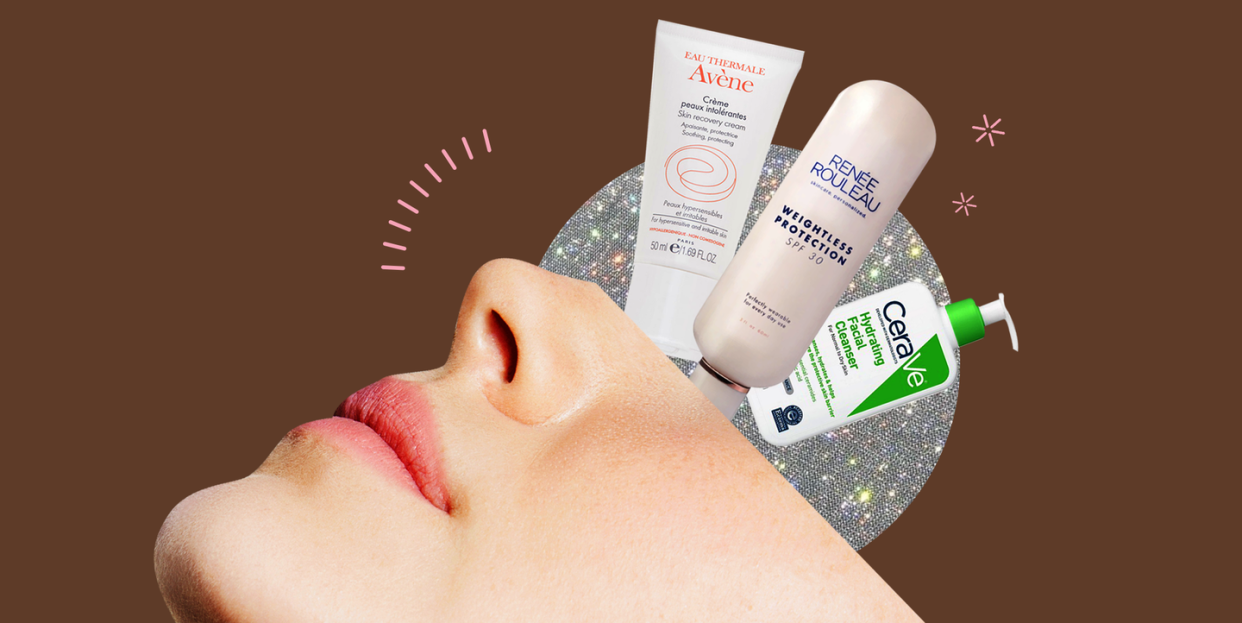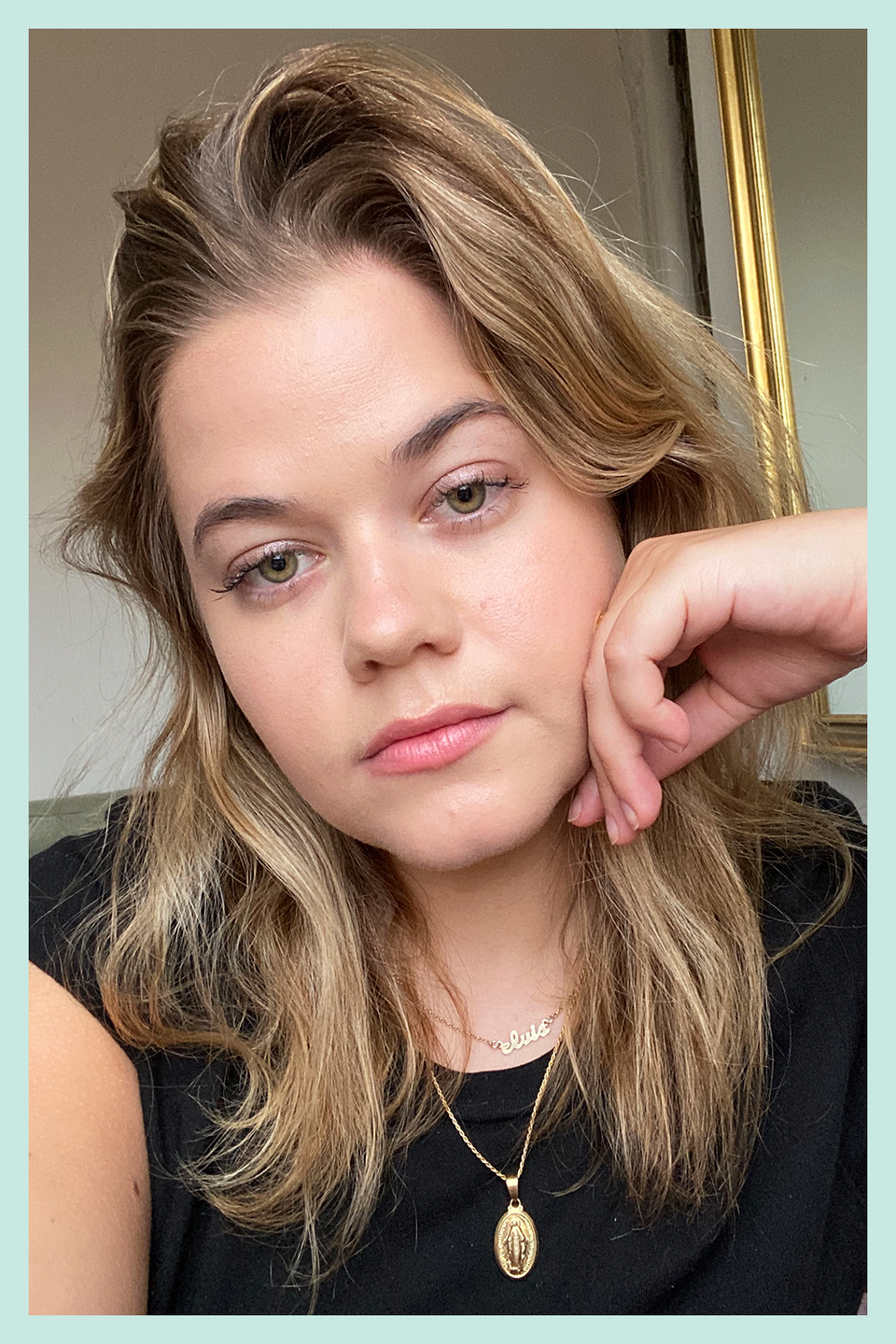I Didn’t Think Fragrance in My Skincare Mattered—Until I Cut It Out

Lol, you know what absolutely sucks? I recently found out that I'm allergic to limonene, a highly popular, highly sensitizing fragrance component that's in every single one of my favorite beauty products (nope, that's not an exaggeration—limonene can be found in the majority of all skin, hair, and body products, from the very fancy to the very cheap).
It took 12 months of living with angry, unexplained eczema rashes camped out all over my face for me to finally book a cosmetic allergy patch test with my dermatologist—a five-day process that tests your skin's reaction to 80+ allergens, and, more often than not, ends with a massive audit of your entire skincare routine (which, as a beauty editor who tests and tries new products on the reg, was kinda my worst nightmare).
But the possibility of no longer waking up with a new rash on my face every morning—and, you know, the inevitable tears and panic that followed? Yeah, that was enough to at least try cutting out limonene from my routine to see how much happier my skin could be.
Here's the thing though: Just scanning ingredients labels for limonene wasn't enough. Since the FDA doesn't regulate fragrance (YUP, I'll get to that in a bit), limonene could be secretly lurking in any and every fragrance component found in a formula. So to give my skin a fair, limonene-free chance, I had to cut out any products that had the words fragrance, parfum, or eau de toilette—basically, go fully fragrance free.
After stripping my beauty routine dry (see my new gentle lineup, below), my rashes disappeared within a freakin' week. And it wasn't just the rashes that subsided either—the whiteheads that would creep up on my jawline and the blackheads that hung out on my chin went MIA, too. Once my skin barrier wasn't constantly irritated and, you know, battling a daily layer of allergens, it could finally function properly—which apparently for me meant smoothing out into the dewy, Insta-worthy canvas of my dreams.
Still, the whole process left me with one very huge, very frustrating question: Why TF does fragrance, a known irritant, even exist in skincare? And, more importantly, why doesn't everyone go fragrance-free? So I turned to two experts in the field—a dermatologist and a cosmetic chemist—to get the final word.
What even *is* skincare fragrance?

It's kinda self-explanatory, but fragrance is added to skincare or beauty products to help the formula smell nice. But even though fragrance can make the overall experience of a product way more enjoyable—like, no one wants to rub a cream all over their face that smells terrible, right?—they can also be incredibly sensitizing. This is especially true for folks like myself with sensitive skin (pls see my selfie for proof), but all skin types can react to it fragrance, even those with seemingly "tough" skin types.
And here's where things get...shadier: According to dermatologist Dathan Hamann, MD, medical director of Saguaro Dermatology and the Contact Dermatitis Institute, there's no legal definition of what fragrance even is in the US. So unlike in the European Union (EU), where brands are legally required to disclose fragrance components in their products, the US gives brands free rein—meaning a company can put the word "fragrance" on a label without actually listing what those specific fragrances are. So even if you have a specific diagnosis (like me with limonene), it's nearly impossible to weed out bad formulas when brands don't disclose their fragrances.
"Beauty manufacturers can simply bucket any fragrance components under the term 'fragrance' on an ingredients label," says Ron Robinson, cosmetic chemist and founder of BeautyStat. "And because 'fragrance' can contain multiple ingredients, there are more chances that one or some of those ingredients might be irritating to your skin," he says, adding that anyone with sensitive skin is best off avoiding fragrance altogether.
Lemme just emphasize this for you one more time: Since fragrance isn't legally defined in the US, brands can put whatever the f*ck they want in their formulas and call it fragrance. And even if you aren't allergic to fragrance, you're still opening the door to potential irritation when you use a fragranced product. Still with me? Good.
How do you know if a product is fragrance free?
Welp, this is where things get even more confusing. Dr. Hamann says the term "fragrance-free" is equally as unregulated. "If you label your cream 'fragrance-free,' you can basically put anything you want in it and you can't get sued, since there's no legal standard for it," he says.

And to make things worse, there are a handful of natural ingredients (like essential oils and plant extracts) that are added to skincare products for scent and experience, but since they aren't technically fragrances, they don't need to be labeled as such. (Tea tree is the perfect example of this, says Dr. Hamann, since it has modest anti-yeast, antibacterial, and antioxidant properties—but, more importantly, it smells really good.)
The same goes for buzzwords like "gentle" or "sensitive"—the only way to know if a product is actually good for your skin is by (A) combing through the ingredients label yourself, and (B) sticking to products and brands that clearly disclose their ingredients. BTW: This doesn't mean your favorite skincare brands are malicious or anything. Dr. Hamann says that only 1 to 10 percent of people that struggle with skin problems are allergic to fragrance, so it's not overwhelmingly common to get full-blown rashes like I did.
But if you are noticing irritation, redness, or increased sensitivity, it's not a bad idea to try cutting fragrance out of your skincare routine. And if you have the means, you should absolutely consider cosmetic allergy patch testing. Fragrance allergies aren't always obvious—you could, say, be allergic to something in your hand cream and only break out on your face—so it's best to see a dermatologist or allergist who can give you a clear diagnosis.
Final thoughts
To be completely honest, I never would have guessed that fragrance would be the culprit of my skin issues—but after cutting it all the way out of my skincare routine, my face has genuinely never looked better (I'm allowed to brag, okay?! You saw my "before" photo, right?). There's really only been one downside to going fragrance-free: My skincare routine no longer smells like a fancy, spa-like facial. It doesn't smell bad, but it's definitely a little boring. At the end of the day, though, I'll take a bland skincare routine for clear, dewy-AF skin in a heartbeat.
You Might Also Like

